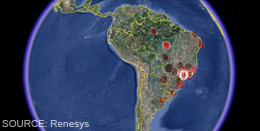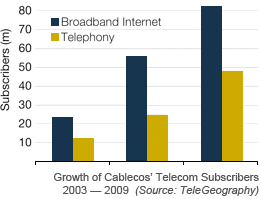

Today Google announced the launch of its own public DNS resolver called Google Public DNS - claimed as part of the company's effort to "make the web faster". Google product manager, Prem Ramaswami, writes: "As people begin to use Google Public DNS, we plan to share what we learn with the broader web community and other DNS providers, to improve the browsing experience for Internet users globally. The goal of Google Public DNS is to benefit users worldwide while also helping the tens of thousands of DNS resolvers improve their services, ultimately making the web faster for everyone." more
Gadi Evron reporting today on Dark Reading: "A National Journal Magazine article called "The Cyberwar Plan" has been making waves the last few days in our circles -- it's about how cell phone and computer attacks were used against Iraqi insurgents by the National Security Agency (NSA). Its significance is far more than just what's on the surface, however. The article describes several issues and that in my opinion confuses what matters..." more
Geoff Daily reports today on the App-Rising.com: "A new model is emerging in Brigham City, a city of less than 20,000 in northern Utah, for how user-owned open fiber networks can be financed and deployed. It used to be that the only way you could get fiber was if you were lucky enough to have a private provider lay it or to live in a city that did it itself. Today in Brigham City, for $3,000 you can buy your own fiber. And in fact more than 1,600 local residents have already bought in to this new opportunity." more
The fifth-annual survey of domain name servers (DNS) on the public Internet -- called a "Pandora's box of both frightening and hopeful results" -- was released today by The Measurement Factory in partnership with Infoblox. more
Reported today on BBC: "Police chiefs are urging people looking for work during the recession to be alert to online scams that trick them into laundering money. The Serious Organised Crime Agency (Soca) says websites are currently being used to recruit 'money mules'. The 'mules are ordinary people who send and receive payments through their bank accounts to facilitate business." Neil Schwartzman has also informed us of a related report by RSA FraudAction Research Lab based on several months of tracking various reshipping scams engineered by online fraudsters. more
In a recent blog post, Google engineers have revealed information about an early stage project called SPDY (pronounced "SPeeDY"), aimed at significantly boosting Web download speeds. According to the post, SPDY is an application-layer based protocol designed for minimizing latency. It says: "So far we have only tested SPDY in lab conditions. The initial results are very encouraging: when we download the top 25 websites over simulated home network connections, we see a significant improvement in performance - pages loaded up to 55% faster. There is still a lot of work we need to do to evaluate the performance of SPDY in real-world conditions." more
 Last night millions of people were left without electricity in two of Brazils' biggest cities, São Paulo and Rio de Janeiro, as a result of a massive power failure. Consequently the outage has also had a significant impact on telecommunications and the Internet routing system in a number of South American regions. According to a related report released today by Renesys, while Brazil took the largest hit, Paraguayan and Uruguayan networks also went out "as a result of the largest regional power outage to hit Brazil and its neighbors in several years." more
Last night millions of people were left without electricity in two of Brazils' biggest cities, São Paulo and Rio de Janeiro, as a result of a massive power failure. Consequently the outage has also had a significant impact on telecommunications and the Internet routing system in a number of South American regions. According to a related report released today by Renesys, while Brazil took the largest hit, Paraguayan and Uruguayan networks also went out "as a result of the largest regional power outage to hit Brazil and its neighbors in several years." more
Managing Intellectual Property, in association with Finnegan, has released an article based on a recently hosted discussion regarding ICANN's approved plans to open the domain name system to an unlimited number of generic top-level domains (gTLDs) and how the Implementation Recommendation Team's (IRT) recommendation will affect brand owners. Topics included the main concerns with new gTLDs from a brand owner's perspective, the role of IRT, enforcement issues, and navigating the new domain name space. Finnegan partners David Kelly and Jonathan Gelchinsky participated with J Scott Evans of Yahoo! Inc., Elisabeth Roth Escobar of Marriott International, Inc., Erik Wilbers of WIPO Arbitration and Mediation Center, and Kurt Pritz of ICANN for the roundtable. more
A class action lawsuit was filed today in Miami-Dade County Circuit Court on behalf of lead Plaintiff Carlos A. Cueto and others who participated in online auctions for domain names. In the lawsuit, Mr. Cueto alleges that an executive of the company conducting the auctions acted as a shill bidder to manipulate bids. The domain names were auctioned online by Oversee.Net, Inc. subsidiary SnapNames.Com, Inc. "The domain name industry is the wild west of intellectual property because it remains unregulated. The online community has been up in arms over what they feel has been an opaque system that just begs for transparency. It is impossible to know whether you are bidding against someone that isn't working or affiliated with the company conducting the auction," said attorney Santiago A. Cueto. more
 CBS's 60 Minutes aired a special report last night investigating how hackers can get into the computer systems that run crucial elements of the world's infrastructure, such as the power grids, water works or even a nation's military arsenal. From the report: "At the Sandia National Laboratories, Department of Energy security specialists like John Mulder try to hack into computer systems of power and water companies, and other sensitive targets in order to figure out the best way to sabotage them. It's all done with the companies' permission in order to identify vulnerabilities. In one test, they simulated how they could have destroyed an oil refinery by sending out code that caused a crucial component to overheat." more
CBS's 60 Minutes aired a special report last night investigating how hackers can get into the computer systems that run crucial elements of the world's infrastructure, such as the power grids, water works or even a nation's military arsenal. From the report: "At the Sandia National Laboratories, Department of Energy security specialists like John Mulder try to hack into computer systems of power and water companies, and other sensitive targets in order to figure out the best way to sabotage them. It's all done with the companies' permission in order to identify vulnerabilities. In one test, they simulated how they could have destroyed an oil refinery by sending out code that caused a crucial component to overheat." more
 In a report released today by the research group, TeleGeography, Executive Director, John Dinsdale says, "traditional telcos have been losing substantial market share while leading cablecos have succeeded in transforming their businesses to the point where almost 40% of their revenues now come from telecoms. Comcast, Time Warner Cable and Liberty Global all now feature in the top 15 ranking of broadband internet service providers, and telecoms remains an engine for growth for many cablecos around the world." more
In a report released today by the research group, TeleGeography, Executive Director, John Dinsdale says, "traditional telcos have been losing substantial market share while leading cablecos have succeeded in transforming their businesses to the point where almost 40% of their revenues now come from telecoms. Comcast, Time Warner Cable and Liberty Global all now feature in the top 15 ranking of broadband internet service providers, and telecoms remains an engine for growth for many cablecos around the world." more
 "What Will the Internet of the Future Look Like?," was the subject of a panel discussion held this week in Washington, DC, organized by the Information Technology & Innovation Foundation (ITIF). The discussion was aimed at examining pending Internet regulations in the U.S. and their impact on packet discrimination, traffic shaping, network management, and carrier business models. The panel, moderated by Robert Atkinson, included: Richard Bennett; Dr. David Farber; Charles Jackson; and Jon Peha. more
"What Will the Internet of the Future Look Like?," was the subject of a panel discussion held this week in Washington, DC, organized by the Information Technology & Innovation Foundation (ITIF). The discussion was aimed at examining pending Internet regulations in the U.S. and their impact on packet discrimination, traffic shaping, network management, and carrier business models. The panel, moderated by Robert Atkinson, included: Richard Bennett; Dr. David Farber; Charles Jackson; and Jon Peha. more
"Such a meeting has been a long time coming, large operators have been losing revenue as the communication market has diversified, network optimization should lend to them finding new revenue streams as the level of service can expand" -- Nick York, NGT Summit Director Asia Pacific. more
According to a recent security report, Spain and the United States are the leading countries when comes to bot-infected computers. Based on data compiled from October by PandaLabs, the research arm of Panda Security, an alarming 44.49% of computers in Spain are infected with bots and United States -- a long way behind -- at 14.41%, followed by Mexico 9.37% and Brazil 4.81%. Countries least infected include Peru, the Netherlands and Sweden, all with ratios under 1 percent. more
Sophie Curtis of eWeek reports: "Researchers have discovered a hole in the secure sockets layer (SSL) protocol, enabling man-in-the-middle attackers to hack into secure applications despite traffic encryption. According to security researcher Chris Paget, hackers can exploit this flaw by breaking into shared hosting environments, mail servers and databases, and inserting text into encrypted traffic as it passes between two end users. This could lead to fragmentation of SSL transactions, giving hackers the opportunity to inject false commands such as password resets into communications which are otherwise encrypted." more
Sponsored byIPv4.Global

Sponsored byDNIB.com

Sponsored byRadix

Sponsored byVerisign

Sponsored byWhoisXML API

Sponsored byVerisign

Sponsored byCSC
